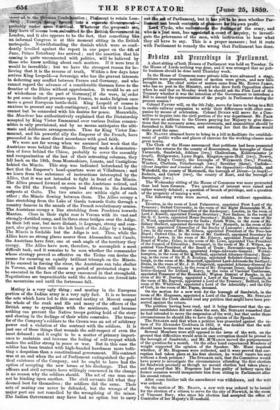Mutiny is a very ugly thing ; and mutiny in
the European portion of the Indian army is a very ugly fact. It is so because the acts which have led to this second mutiny at Meerut compel the whole of the rank and file and many of the officers of the British army to sympathize with the mutineers, and because nothing can prevent the Native troops getting hold of the story and sharing in the feelings of their white comrades. The trans- fer of the Company's soldiers to the Crown was an act of arbitrary power and a violation of the contract with the soldiers. It is just one of those things that wounds the self-respect of even the most debased ; and it ought to be a matter of primary import- ance to maintain and increase the feeling of self-respect which makes the soldier strong in peace or war. But in this case the soldier has been treated with high-handed harshness more befit- ting a despotism than a constitutional government. His contract was at an end when the act of Parliament extinguished the poli- tical existence of the Company, and he ought to have had the option of accepting the new terms or his discharge. That the officers and civil servants have willingly concurred in the change is no reason why the soldiers should. The act of one man can- not be binding upon another. The civil servants did what they deemed best for themselves ; the soldiers did the same. Their acts of mutiny can never be defended, but the wrongs of the major part are not remedied by the wrongdoing of the minor. The Indian Government may have had no option but to carry out the act of Parliament, but it has yet to be men whether Par- liament Ca31 break contracts at pleasure for its own profit.
Lord Clyde, who understands the feelings itf the army, and who is a just man, has appointed a court of inquiry, to investi- gate the grievances of the men, with instruction to hear what they all have to say. This is a proper measure ; but it rests with Parliament to remedy the wrong that Parliament has done.
























 Previous page
Previous page